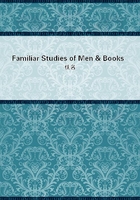
第32章
Nor is this exhaustive; for in his character of idealist all impressions, all thoughts, trees and people, love and faith, astronomy, history, and religion, enter upon equal terms into his notion of the universe. He is not against religion; not, indeed, against any religion. He wishes to drag with a larger net, to make a more comprehensive synthesis, than any or than all of them put together. In feeling after the central type of man, he must embrace all eccentricities; his cosmology must subsume all cosmologies, and the feelings that gave birth to them; his statement of facts must include all religion and all irreligion, Christ and Boodha, God and the devil. The world as it is, and the whole world as it is, physical, and spiritual, and historical, with its good and bad, with its manifold inconsistencies, is what he wishes to set forth, in strong, picturesque, and popular lineaments, for the understanding of the average man. One of his favourite endeavours is to get the whole matter into a nutshell; to knock the four corners of the universe, one after another, about his readers' ears; to hurry him, in breathless phrases, hither and thither, back and forward, in time and space; to focus all this about his own momentary personality; and then, drawing the ground from under his feet, as if by some cataclysm of nature, to plunge him into the unfathomable abyss sown with enormous suns and systems, and among the inconceivable numbers and magnitudes and velocities of the heavenly bodies. So that he concludes by striking into us some sense of that disproportion of things which Shelley has illuminated by the ironical flash of these eight words: The desire of the moth for the star.
The same truth, but to what a different purpose! Whitman's moth is mightily at his ease about all the planets in heaven, and cannot think too highly of our sublunary tapers. The universe is so large that imagination flags in the effort to conceive it; but here, in the meantime, is the world under our feet, a very warm and habitable corner. "The earth, that is sufficient; I do not want the constellations any nearer," he remarks. And again: "Let your soul stand cool and composed," says he, "before a million universes." It is the language of a transcendental common sense, such as Thoreau held and sometimes uttered. But Whitman, who has a somewhat vulgar inclination for technical talk and the jargon of philosophy, is not content with a few pregnant hints; he must put the dots upon his i's; he must corroborate the songs of Apollo by some of the darkest talk of human metaphysic. He tells his disciples that they must be ready "to confront the growing arrogance of Realism." Each person is, for himself, the keystone and the occasion of this universal edifice.
"Nothing, not God," he says, "is greater to one than oneself is;" a statement with an irreligious smack at the first sight; but like most startling sayings, a manifest truism on a second. He will give effect to his own character without apology; he sees "that the elementary laws never apologise."
"I reckon," he adds, with quaint colloquial arrogance, "I reckon I behave no prouder than the level I plant my house by, after all." The level follows the law of its being; so, unrelentingly, will he; everything, every person, is good in his own place and way; God is the maker of all and all are in one design. For he believes in God, and that with a sort of blasphemous security. "No array of terms," quoth he, "no array of terms can say how much at peace I am about God and about death." There certainly never was a prophet who carried things with a higher hand; he gives us less a body of dogmas than a series of proclamations by the grace of God; and language, you will observe, positively fails him to express how far he stands above the highest human doubts and trepidations.
But next in order of truths to a person's sublime conviction of himself, comes the attraction of one person for another, and all that we mean by the word love:-"The dear love of man for his comrade - the attraction of friend for friend, Of the well-married husband and wife, of children and parents, Of city for city and land for land."
The solitude of the most sublime idealist is broken in upon by other people's faces; he sees a look in their eyes that corresponds to something in his own heart; there comes a tone in their voices which convicts him of a startling weakness for his fellow-creatures. While he is hymning the EGO and commencing with God and the universe, a woman goes below his window; and at the turn of her skirt, or the colour of her eyes, Icarus is recalled from heaven by the run. Love is so startlingly real that it takes rank upon an equal footing of reality with the consciousness of personal existence. We are as heartily persuaded of the identity of those we love as of our own identity. And so sympathy pairs with self-assertion, the two gerents of human life on earth; and Whitman's ideal man must not only be strong, free, and self-reliant in himself, but his freedom must be bounded and his strength perfected by the most intimate, eager, and long-suffering love for others. To some extent this is taking away with the left hand what has been so generously given with the right.